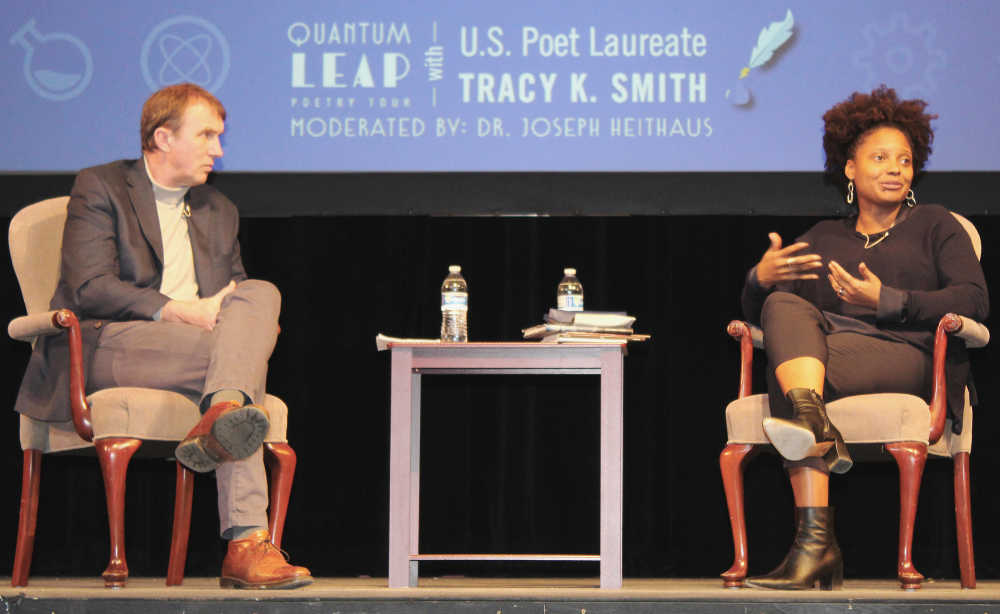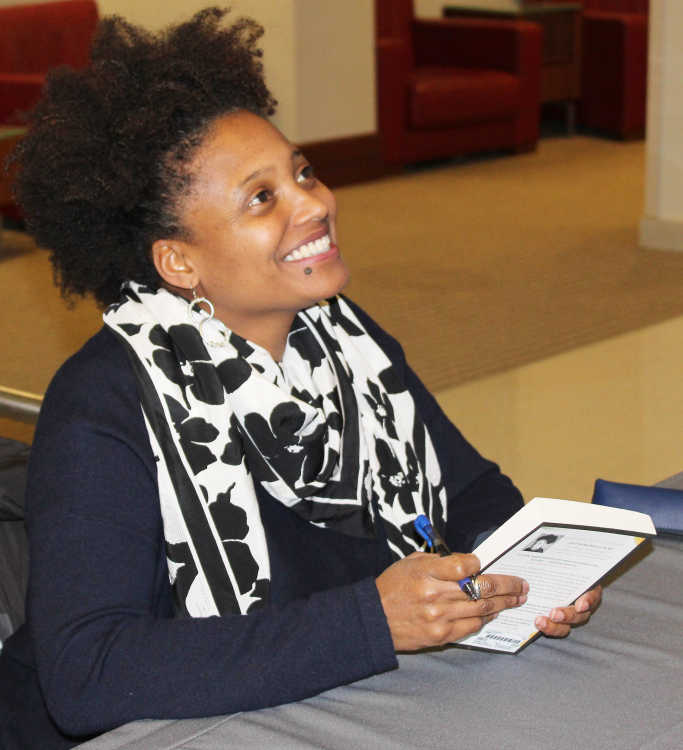U.S. poet laureate finds inspiration in struggle, different perspectives

Before what was a packed house in Moore Theatre inside DePauw University’s Green Center for the Performing Arts Wednesday evening, African-American poet Tracy K. Smith summed up her idea of how academics are intrinsic in practice to art such as creative writing.
“The act of research is a creative act,” she said with a smile, “and it’s rooted in both being able to express a need, a desire and a want to understand more about things and people.”
During an evening that was highlighted by deep insights into the tumultuous political and social climates within the United States, Smith offered original perspectives on how the sciences can inspire inquiry, and also what it means to belong to a community.

The current United States poet laureate and Pulitzer Prize winner visited DePauw’s campus as part of an across-state poetry tour in partnership with Indiana Humanities, a non-profit organization that aims to promote reading, writing and conversation in local communities.
Her presentation and the following discussion served as the closing program for the organization’s two-year initiative called “Quantum Leap,” which focused on problem solving through bridging subjects in the humanities like poetry, history and philosophy with subjects in science, technology, engineering and math (STEM).
This was an appropriate avenue for Smith to share her work, which itself has been greatly inspired by an interest in science she has cultivated throughout her life. Smith’s 2011 volume “Life on Mars,” which was awarded the Pulitzer Prize in Poetry in 2012, is written through science-fiction themes that were inspired by her father, who worked as an engineer on the Hubble Space Telescope.
Those themes are accompanied by personal commentaries and observations which tackle prejudice, racism and inequality throughout her poetry. They also provide a sense of hope and creativity that can inspire progress in society through the humanities and sciences.
As he gave short remarks to introduce Smith and Indiana Humanities, DePauw University President Mark McCoy said her poetry and the goal to bring people together were important in sustaining a community. He implied that this was especially true for a college town like Greencastle.
“Smith has dedicated her tenure as a poet laureate to outreach and to building a bridge between the town and gown,“ McCoy said. “That is in line with what we strive to do here at DePauw, and events like this play a large part to bring new perspectives to the community.”
As she took the stage and began her readings from “Life on Mars” and her upcoming collection “Wade in the Water,” Smith felt that poetry is thriving in a social and political climate that has been fraught with tension and negativity.
“It’s a good time for poetry,” Smith began. “I think it has become a mode of learning about the vocabulary we can use to express empathy. As a poet laureate, it is a privilege and a need to celebrate the voices of so many poets who have tackled those issues.”
Smith read a poem that she considered the centerpiece of “Wade in the Water,” which draws upon letters which were sent by former slaves who fought in the Civil War to President Abraham Lincoln. As she recounts how they were seeking their soldiers’ pensions, Smith poignantly enunciates how many could not give their exact age or where they were from, or even what they thought were their real names.
“Reading and writing about this has made me think in terms of how to belong in a country that doesn’t accept you,” Smith said of the poem. “It’s about how you could think about questions of American history in the 21st century.”
She then read another poem called “Refuge,” which she said was a “thought exercise” about what sacrifice means when one gives their safety and peace for another person to grow.
A striking line from the poem went like this: “Your sister in a camp in Turkey/Sixteen, deserving of everything:/Let her be my daughter, who has/Curled her neat hands into fists/Insisting nothing is fair and I/Have never loved her.”
Those two poems were the highlight of Smith’s reading, after which she sat down to have a conversation with DPU Professor of English and fellow poet Joe Heithaus. Smith is an educator in her own right as a professor of creative writing at Princeton University. She holds a Master of Fine Arts (M.F.A.) degree from Columbia University, and previously held a Stegner Fellowship at Stanford University from 1997 to 1999.
Before the discussion began, Keira Amstutz, president and CEO of Indiana Humanities and a 1991 DePauw graduate, offered a few more words on the mission of the “Quantum Leap” initiative.
“The theme of this initiative tackles a very important question of science and the humanities,” she said, “and it tackles what it means to be human in this age of technology. Poetry fits in a very important manner that way.”
Amstutz also referenced the work by Heithaus, whose poem “What Grows Here” prominently stands out on the side of a barn along West Walnut Street Road.
Heithaus asked Smith about how she approached her craft, about science and its implications and her thoughts on understanding between people with different backgrounds.
“When I started to work on my second book (called “Duende”), it began questions about my anxieties as a person,” she related. “I like to bring myself into uncomfortable proximity to those darker elements of our society.”
“I chose to do that through sci-fi,” she added. Smith segued this into her thoughts about the image of God as she went through the creative process.
“My image of God came from the image presented in the Old Testament, which is one of anger and grandeur,” she said. “But as I came to write more and think more about how we figure into the immense universe, I began to say, ‘That can’t be it. What else is there?’”
“People in science, and science in general, are good at metaphors,” Smith said further. “Science leads to thinking more broadly about things like religion, because we don’t know all that’s out there. I think my poetry, especially in “Life on Mars,” takes its cue from that.”
Heithaus transitioned from those implications to the complex humanistic issue of borders that are more personal than physical. Smith said expression is a primal motive of poetry, and that it is further a motive of activism.
“Poetry makes me question binaries of good vs. evil and black vs. white,” she explained. “Poems ask questions, and they can force us to go outside pure logic; to try to make sense out of what doesn’t make sense.”
Smith believed that her work allows her to analyze the more troubled aspects which occur in American society like racism, because she learns as she goes.
“The poem knows what I didn’t know,” she put it.
After Heithaus concluded his inquiries, the floor was opened up to audience members who asked various questions about her work, as well as her thoughts on fighting against prejudice.
One DPU student asked Smith about how promoting justice and equality through poetry could solve issues related to race and misunderstanding. Smith professed that her effort was all that is needed to help communities move past differences.
“I am excited about the legacy of black activism that is being built today,” she said. “It’s not just about race; it’s also about how I can try to fix it so that we can all belong. I can take a small chance to make something good.”
Another student made an interesting observation that “Life on Mars” could’ve been a sort of eulogy for Smith’s father, who died while she was writing it. Additionally, he noted that several of her poems' titles are taken from songs by David Bowie. Smith essentially agreed with the student’s take, saying that some of her poems’ themes take inspiration from the famously non-conformist singer.
A final question posed to Smith asked where she felt her creativity lies when writing poetry in a time as complicated as the present. She in turn said she took stock in “revisiting” traditional forms to “look again” at things which interest or concern her.
Smith closed the Q and A by reading her poem “An Old Story,” which shows the possibility of going from confusion and bleakness to a sense of hope. The poem ends as such:
“Then animals long believed gone crept down/From trees. We took new stock of one another./We wept to be reminded of such color.”
